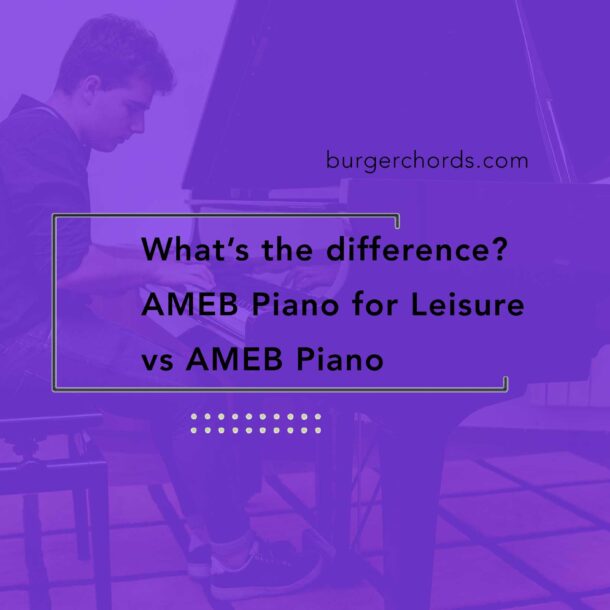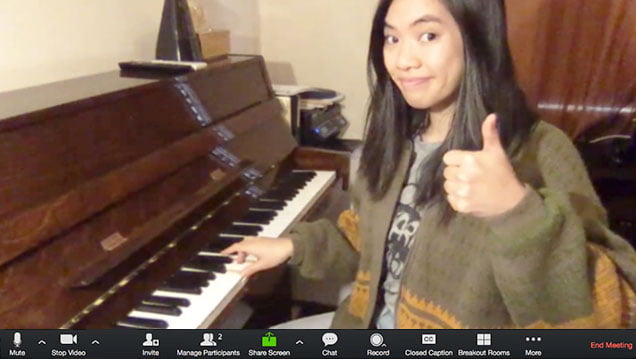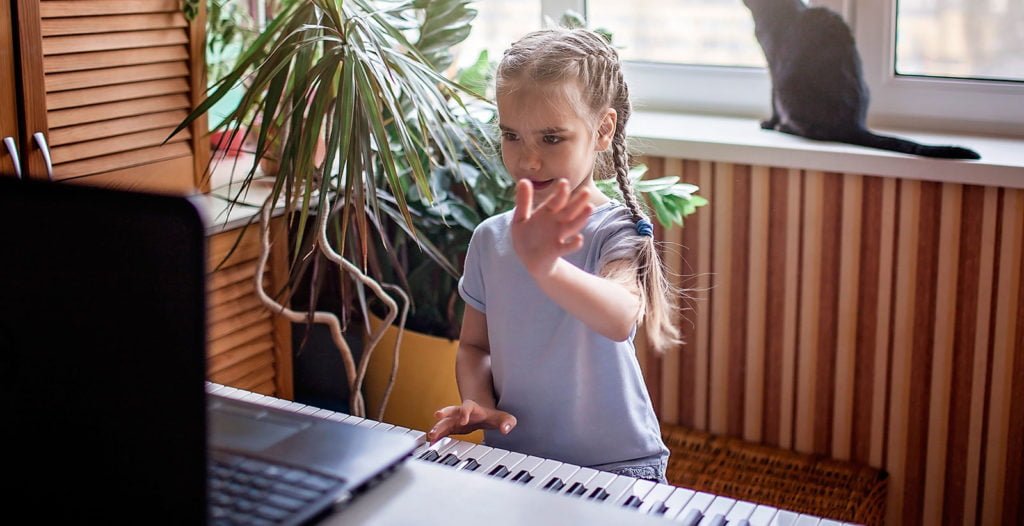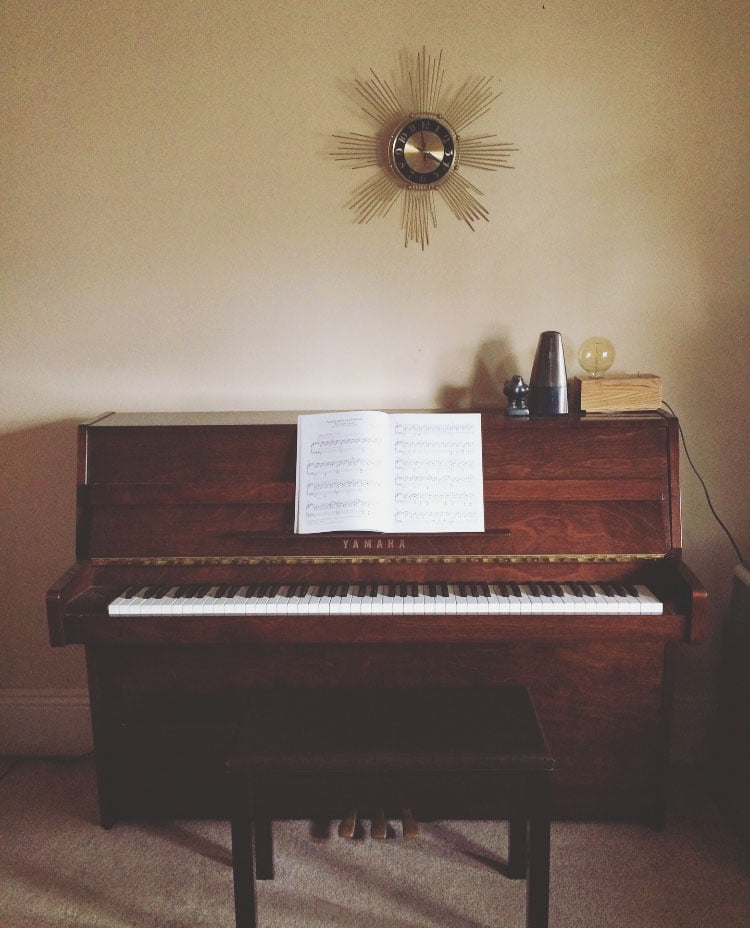

Teaching both online and onsite piano lessons is an interesting challenge! For many years I was adamant about teaching only onsite piano lessons, but in the past year I’ve converted to ‘the other side’.
Simply put, online and onsite piano lessons are very different. But both offer great opportunities for learning piano!
Here, I’ll outline the pros and cons of each. That way, you can decide for yourself whether online or onsite piano lessons are for you.
Learning Piano Online (with a teacher)
The set up for an online piano lesson seems daunting at first, but it’s actually super simple. Students need:
- a keyboard or piano (can be any size, even a tiny MIDI keyboard will do)
- a device with a mic and camera (e.g. phone, tablet, laptop)
- an internet connection
That’s it!
Often, lessons are taught over Zoom, Skype or other video conferencing software. There are also new platforms like JamKazam and Rock Out Loud who creating specific tools for video music lessons.
For my online lessons, I currently use Zoom because it’s simple and familiar for most people to use. It’s not the greatest for lag or sound quality, but it is dead easy for anyone to get on a Zoom lesson. For me, easy is best!

Pros of Online Piano Lessons
- No travel
1-on-1 piano lessons can be done online in the comfort of you own home. This is perfect for any student who can’t travel to lessons, or live regionally or far away from the piano studio. For parents, it saves the stress of arranging transport for kids. It’s also great for busy adults who might find travel a barrier to attending weekly lessons.
- Great ear training
No matter how the device is set up, it’s quite hard to look at a screen and play at the same time. Therefore, I find this forces both teacher and student to listen harder to each other during the lesson. Over time, this develops awesome aural skills! This makes online lessons a great mode to learn improvisation and playing without sheet music.
- Online communication skills
Sure, you or your kids can talk purely with Bitmojis. But complex activities such as music lessons truly teach online communication skills. Online piano lessons offer a unique space for activities like recording and performing, which are harder skills than many realise!
Is your child ready for piano lessons? Here’s the telltale signs >

Challenges of Online
- Slow internet
Slow internet days are ‘pull-out-your-hair’ levels of annoying. While I have found a few workarounds, and luckily for me, bad connections are few and far in-between. Still, a slow internet connection disrupts a music lesson in a tedious way.
- Hand visibility
Even with an overhead camera, it’s a bit hard to see anyone’s hands during a piano lesson. This is for a number of reasons, for example video-call quality, camera angle, camera quality, lag time, screen refresh rates, screen size, internet speed, video compression, video platform, and so on. However, this does force students to use their ears more. Admittedly this was hard at first, but I found that students adapted after a few weeks!
- Independent learning
Without a teacher in the room to focus attention, students need to be independent learners for online piano lessons. Unfortunately, this makes 1-on-1 online lessons quite hard for very young students (4-5 years old). For this age group, I recommend onsite lessons.
Are online piano lessons any good? Read the answer here >
Learning Piano Onsite
Most teachers have students attend onsite at a music studio, although a few offer face-to-face lessons in your home. Personally, I prefer lessons at a music studio so all students can play on a nice piano. Also, it’s nice to get out of the house!

Pros of Onsite Piano Lessons
- Live music / group playing
Playing music with other people is super fun! The energy that comes from jamming with another person in the room is truly hard to replicate online. Mainly, the audio and visual limitations of online video calls make it hard for even seasoned musicians to play as a band or group. However, there are exciting live-streaming platforms developing that may make this easier in the future!
- Suits different learning styles
Onsite piano lessons provide a mixed learning environment. As a teacher, I can draw stuff, I can demonstrate it, I can sing it, I can wave my arms around, I can point to things, and I could do all of those things at once. Also, my students can do all of those things with me too. This multi-sensory engagement is the reason why I recommend onsite lessons for very young students (4-6 years old), rather than online.
- Easier to start
For a first piano lesson, students don’t need anything except themselves. Over the years, I’ve had absolute beginners who were keen to play but unsure about the expense of buying an instrument. It was easy for them to gauge their own interest after the first piano lesson, and I could advise them on the best gear to get for their budget.
Challenges of Onsite Lessons
- Travel
Not all students can travel to music studios for lessons. Plus, if you live regionally, your nearest piano studio could be ages away!
Online is a great way to go if weekly travel to lessons is not feasible. I recommend sticking to regular weekly lessons (online or onsite), as a predictable routine is better for progress than an ever-changing schedule.
- Logistics for parents
The weekly juggling act of pickups and drop-offs is real. If this is a stressor for you, it’s worth considering online piano lessons.
- The “covid-norm”
In the ‘after’ times of 2020, our new “covid-norm” does pose some odd challenges to onsite piano lessons. There are extra requirements like hand sanitising and cleaning, and other logistics such as attendance limits on parents/guardians in the room.
Ready to try a piano lesson?
Conclusion: which is better?
Honestly, both are great! So much so, I now offer online and onsite piano lessons because I see educational value in both. The benefits of either music teaching modes far outweigh any of the challenges they pose.
For students, I was amazed by how well players (both kids and adults) could adapt from onsite to online lessons, and vice versa. This makes me confident that both online and onsite piano lessons are awesome! The key really, is to just do it!

About the piano teacher
Michelle is a freelance pianist and piano teacher who aspires to make music fun and accessible for anyone who wants to play. She’s been playing and teaching piano to kids and adults for over a decade, and brings good vibes playing piano for weddings and events at Michelle Plays Piano.
Michelle also plays drums in post-punk and indie bands around Melbourne, and has written about bands for The Music and EARMILK. When she’s not obsessing over music, she’s probably thinking about food.



